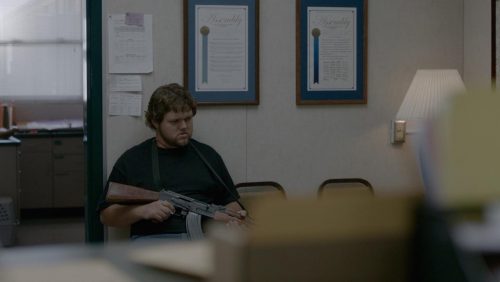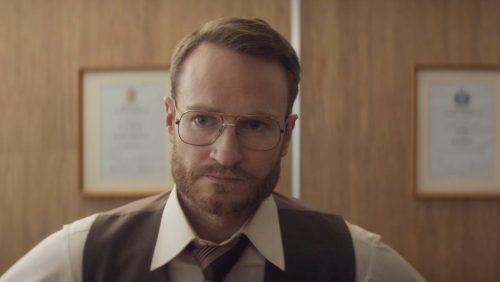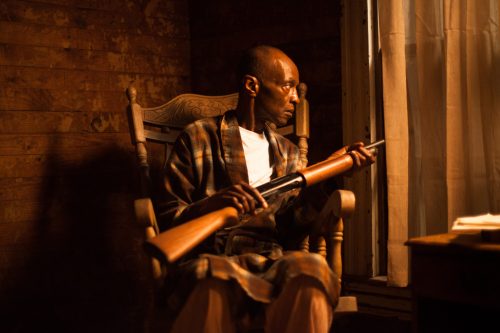The 2018 Oscar-Nominated Live-Action Shorts: Heaviness and Humanism, by Craig Schroeder
“The Silent Child” dir. Chris Overton
Films, or art for that matter, are radical pieces of activism, promoting the ideals of their creators to a larger audience. Some films are more overt about the kind of change they intend to foster. Chris Overton’s “The Silent Child,” about a young deaf girl struggling to adapt to her otherwise normal world in a bougie family that doesn’t quite understand how to handle her disability, is the year’s most apparent call for change. While many films with conspicuous calls to action fail to deftly weave activism and art, The Silent Child is a charming film that allows audiences to take the very first step in any kind of reform: understanding.
Libby (played by first time actress Maisie Sly) is the youngest daughter in a family of five. Her parents are busy and her siblings active, relegating Libby to a lonely existence where her family sees her deafness as more of a crippling disability than an obstacle in an otherwise normal life. Her family hires Joanne (Rachel Shenton), a social worker who assists deaf children, who discovers Libby to be an intelligent child with potential beyond the confines her family and society has placed her in. The film’s main goal is for the audience to tap into the frustration of being misunderstood and forced into a paradoxical kind of loneliness, surrounded by loved ones who are speaking in a foreign language. Overton does tremendous, subtle work in communicating this point; in a scene around the dinner table, the sound drops out and Libby’s family are filmed in close-up carrying on an animated conversation that both Libby and the viewer are drawn into yet left completely in the dark. The film’s weak spot is its screenplay, which often lacks subtlety and feels a bit too pointed. Joanne, as Libby’s mentor and advocate, gives voice to the film’s thesis, which means Rachel Shenton has to handle some of the heavy-handed dialogue (it should come as no surprise the film’s strongest moments are its quietest ones) and does a fantastic job of making the clunkier bits of exposition feel natural.
If I’m being cynical, I’d bet that Overton’s “The Silent Child” will take home the statue for Best Live Action Short Film (full disclosure: I have a historically terrible history of predicting Academy Award winners, so please take my prediction with an entire shaker of salt). Like “The Silent Child,” recent winners “Sing” and “Stutterer” are similar insulated stories of young people overcoming adversity. Even more in tune to the Academy’s predilections to feel a part of a movement, “The Silent Child” ends with a quite literal call-to-action, with a closing title card advocating for the use of sign language in all schools to assist deaf children who often go forgotten.
“Dekalb Elementary” dir. Reed Van Dyk
Like Sean Baker’s The Florida Project, Reed Van Dyk’s “Dekalb Elementary” has a level of compassion and humanity that makes it my favorite film in this field of Oscar nominees. “Dekalb Elementary” is a real-time film chronicling a thwarted school shooting in Dekalb County, Georgia. When a disturbed young man walks into an elementary school’s administrative office with an assault rifle, the woman at the front desk (played by Shinelle Azoroh, giving one of the best performances of the year), doesn’t panic or run away but calmly addresses the would-be shooter, appealing to decency and human connection. Based on a true story wherein school administrator Antoinette Tuff encountered a gunman in the elementary school where she worked and negotiated his peaceful surrender with love and compassion, “Dekalb Elementary” is a beautiful film about the necessity of kindness and understanding.
Van Dyk’s screenplay outlines what is at stake in the opening minute, almost wordlessly without ever venturing outside the confines of the school’s administrative office. Bo Mitchell (who you may recognize in a completely different light as Kenny Power’s chubby, bushy-haired nephew on Eastbound and Down) as the man with the gun, is given the nearly insurmountable task of making a school shooter sympathetic. Van Dyk’s screenplay once again does the heavy lifting, giving quick glimpses of a disturbed mind but never losing sight of the insidious nature of depression and mental illness. Van Dyk makes interesting choices with his camera that are effective in conveying the film’s claustrophobic sense of fear and paranoia while still putting the characters in context to the world around them. Van Dyk’s camera films the two leads in wide angle shots allowing them to occupy the same space without ever isolating one character on a different plane. “Dekalb Elementary” isn’t just a portrait of a hero, it’s a manifesto on the power of humanity.
“The Eleven O’Clock” dir. Derin Seale
Derin Seale’s “The Eleven O’Clock” is the only “light” Oscar nominated live-action short film of the year. Whereas the other nominees deal with racism, school shootings, and other somber affairs, “The Eleven O’Clock” is an absurdist comedy about a psychiatrist working with a patient who thinks he is a psychiatrist working with a patient who thinks he is a psychiatrist. It’s a comedic, lo-fi mind-bender that extrapolates the common trope of mistaken identities. However, “The Eleven O’Clock” suffers by not having defined its stakes clearly enough. The audience knows one of the men (played by Damon Herriman and writer Josh Lawson) is a doctor and one is an unwell mental patient; the question is which one? In a slightly better screenplay, there would be additional stakes attached to this confusion, heightening the comedic tension as two men insist they are there to help the other with their delusions of grandeur. Unlike “Dekalb Elementary,” which immediately and definitively define the central tension and the stakes with almost no dialogue, “The Eleven O’Clock” leaves the audience with no reason to invest themselves in either person.
In addition, the screenplay is riddled with lazy devices (the secretary who could easily identify the real doctor is conveniently out and has been replaced with a temp) and plot holes that make the exchange between these two men tedious and frustrating. As the men continue to battle back and forth for mental supremacy, it’s obvious the office is decorated with family photos and framed diplomas that go unnoticed by the characters but leave the audience frustrated, shouting “just look at the decor, asshole!”
“The Eleven O’Clock” has a funny premise that would make an excellent short on a sketch comedy show or a Funny or Die clip. There is a comedic energy that makes the film watchable, but expanded to thirteen minutes without ever developing the plot beyond its initial conceit, “The Eleven O’Clock” wears out its welcome by minute six and leaves audiences waiting on a moment of catharsis that never comes.
“My Nephew Emmett” dir. Kevin Wilson Jr.
The story of Emmett Till is one that has been told again and again in America. Walter Scott. Trayvon Martin. Freddy Gray. LuQuan McDonald. Oscar Grant. Alton Sterling. Tamir Rice. Eric Garner. Till’s name has become an ominous synonym for the dangers associated with simply existing in America as a young, black man. Kevin Wilson Jr.’s (only the third African-American to receive a nomination for Best Live Action Short Film and would be the first black winner should the film take home the prize) “My Nephew Emmett,” as the title suggests, removes itself one step away from young Emmett Till—the teenager murdered in Mississippi in 1955 for allegedly whistling at a white woman—and tells the story of his final days from the perspective of his loved ones who were forced to become spectators to one of history’s ugliest moments.
The most effective part of “My Nephew Emmett” is its illustration of the capricious absurdity of “justice” in the Jim Crow South. For white Americans—especially those of us living in the south—it’s a more comfortable thought that Jim Crow was a faceless product of an institution; it’s truer and far less comfortable to admit that Jim Crow was an institution that allowed and encouraged state sponsored terrorism by our fathers and grandfathers. “My Nephew Emmett” gives the Jim Crow south a name and a face that can’t hide behind politics or history. In “My Nephew Emmett,” when Jim Crow knocks on Emmett Till’s door he doesn’t look like a page in a history book. Emmett Till’s Uncle Moses, played beautifully by L.B. Williams, faces an impossible dilemma: invite Jim Crow in or let him burn down the house. Williams communicates the horrors of Jim Crow, the sadness, confusion, conflict, and pain, with quiet benevolence and stoic silence. The story of Emmett Till has become a distinct strand in the DNA of America; Wilson Jr.’s “My Nephew Emmett” contextualizes the personal pain of racism behind every black person killed at the hands of an unjust system, reminding audiences that behind each name that has become an unwilling symbol, is a family in mourning.
“Watu Wote: All of Us” dir. Katja Benrath
Look, I know if I predict a second winner from this field, my credibility as an Oscar prognosticator is totally bunk. But “Watu Wote: All of Us” is the kind of timely, global, big picture film that is vital in our understanding of how to empathize with the “other” without demonizing them. It’s easy to see how in our current political climate, the Academy would want to single out a film like this for recognition. My money is still on “The Silent Child,” but I’d pick “Watu Wote” as a close-second choice.
For the better part of the 21st century, East Africa has been terrorized by Al-Shabaab, the jihadist militant group with a stronghold in Kenya and Somalia. “Watu Wote: All of Us” (“All of us” is the literal translation of the Swahili phrase watu wote), from director Katja Benrath, is the true story of a passenger bus traveling through a particularly dangerous border area when stopped by a faction of Al-Shabaab militants whose intent to execute the Christian passengers was derailed by Muslim citizens aboard the bus. The film’s central figure is Jua (Adelyne Wairimu), a Christian woman with a distrust of all Muslims after her family was murdered by Al-Shabaab. Filmed in close-up, frequently isolated from her surrounding passengers, Jua’s sense of fear and isolation (which seems to be a running theme in this year’s batch of live-action short contenders) is palpable. Once Jua’s existence is threatened, Benrath no longer films her in tight isolation, but instead as a part of a larger group, weaving her into the fabric of the people protecting her and the ones she has been weary of. Like “Dekalb Elementary,” “Watu Wote: All of Us” is a beautiful work of humanism that feels vital and necessary.
































